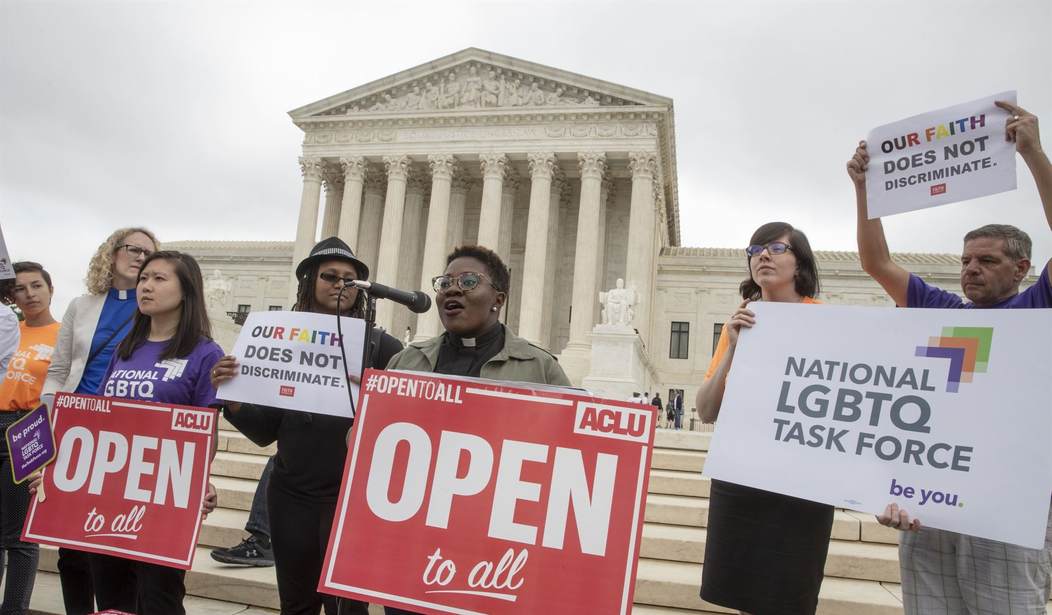It’s beginning to feel as if we’ve been being lectured about all matters relating to LGBTQ+ for as long as anyone can remember. But that’s really not true. It wasn’t that long ago when conversations about gay marriage and related civil rights issues were shortened with the acronym “LGB.” That of course stands for lesbian, gay, and bisexual. Then, at some point, people started tacking on the T and Q for transgender and queer. Finally, rather than adding on even more ridiculous bits of the alphabet, they stuck a plus sign on the end. But we may be heading for a course reversal in this trend, and it’s a point I’ve been trying to make for years. In an opinion piece for the New York Post, Chadwick Moore argues that it’s time to “decouple” the T and the Q from LGB because they really don’t have much in common.
A movement is underfoot on both sides of the Atlantic to decouple the alphabet soup that has come to be known as “LGBTQ+.”
As rising numbers of old-fashioned LGBs see it, the “T” — for transgender — and “Q” for queer, don’t necessarily have much in common with gays and lesbians.
For these ideological reformists, the LGBTQ mash-up and community-wide obsession with trans issues is sowing confusion and chaos within politics and popular culture — eroding much of the progress sexual minorities have fought to achieve. Their nascent efforts have led to a swell in both online and IRL activism that’s pushing back against gender ideology and fueling a movement increasingly known as “LGB Without the T.”
As far as the extra letters go, we’ve been covering issues dealing with transgenderism here for a long time so I’m sure you’re all familiar with that. In terms of the Q, I’ve never been entirely sure what that means in the modern era. It’s supposed to stand for “queer,” but that used to be a generic (and pejorative) term for anyone who was gay or bisexual. What does it mean today and how is it different from L, G, and B? I found a Wikipedia definition saying that it represents ” a broad spectrum of non-normative sexual or gender identities and politics.” That’s not terribly helpful either, at least for me.
Returning to what Chadwick Moore is describing, it seemed to me that forcibly binding these groups together under one umbrella that everyone in the “community” is supposed to simply accept was a poor idea from the start. Moore points out that the various groups “don’t necessarily have much in common.” I would go one step further and argue that they frequently wind up being at odds with each other in some cases. For one thing, there are plenty of women, including lesbians, who side with Riley Gaines and don’t want men competing in women’s sports no matter what they are calling themselves. And the LGB community was out there fighting for rights like marriage, parental recognition, and protection from discrimination in employment long before the transgender social contagion began sweeping the nation.
That brings us to another key difference that I’ve attempted to bring up here before. Gay and lesbian people are real. They’ve been with us for all of recorded history. (Either that or this is the longest-running practical joke that’s ever been attempted. Just kidding…) Transgenderism was, until very recently recognized as a mental illness and it was vanishingly rare. Now it clearly seems to be some sort of fad that has spread like wildfire. People can just wake up one day and declare that they are “differently gendered” or whatever. I’ve never heard of anyone who simply “decided to be gay.”
The problem with “decoupling” the groups, as Moore points out, is that it can get you in a lot of trouble. Any LGB people who start dropping the TQ on social media almost immediately are hit with a response that “has been swift and vicious.” They are labeled “transphobic” and have been subjected to “death threats, doxing, online harassment, and physical violence.”
Since I don’t swim in that end of the pool, I really don’t have a horse in this race. But it certainly makes sense to me, and if any of our LGB friends have been feeling the same way and want to start shortening the acronym, I’ll happily go along with them.








Join the conversation as a VIP Member